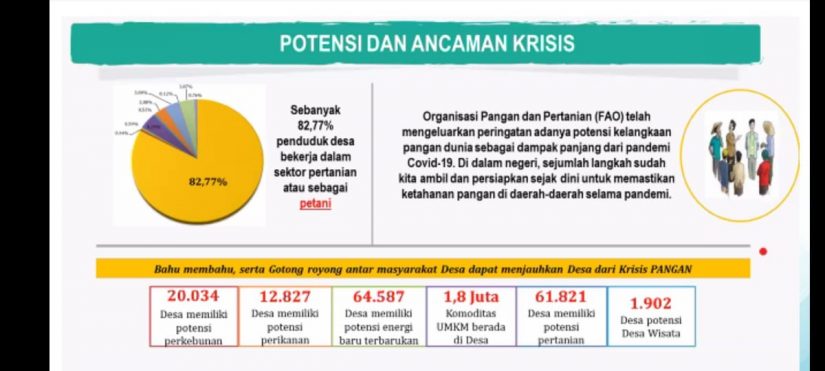
Yogyakarta, September 11th 2020 – Sharing Session which was held by Creative Hub Fisipol UGM on Friday (11/9) presented Rudy Suryanto, the expert of BUMDes also the lecturer of Universitas Muhammadiyah Yogyakarta (UMY), as the speaker. Through the Google Meet platform, this event brought a topic “Unpopular Business: BUMDes and How to Survive in a Crisis Period”. Matahari Farransahat, the director of C-Hub Fisipol UGM, became the moderator of this event.
BUMDes (Villages’ Enterprises) are growing rapidly every year, until now, around 51,149 BUMDes have been formed. From the last month’s data, as many as 39,634 were re-registered, it means that several BUMDes are inactive after they were established. But, from those numbers, turned out more than 10,000 BUMDes are still active during this pandemic. Rudi assessed that there are several factors that distinguish BUMDes that are still or not moving. First, full support from the village government and community participation or cohesiveness. “The only way to survive a crisis is with togetherness, mobilize the social solidarity that will become financial capital, how gotong royong is used to survive a crisis (pandemic),” Rudy said.
Second, how BUMDes were targeting traditional markets to survive and grow their business in the middle of pandemic. In this case, BUMDes’ responses to face a difficult situation are different, one of the reasons is because the locations’ differences, either it is located in the village or it is close to the city. Rudy saw that there was an interesting phenomenon where the pandemic has given momentum for villages to play an important role again. Third, the key to product development is the use of digital technology to interconnect villages in various regions. The current digital development encourages an unlimited market potential in time and space.
From some data, Rudy revealed that even though there was a decrease in income, in fact Indonesia’s economy is not too bad compared to other countries because we have a lot of potential in the village, namely 20 thousand plantation potentials, 12 thousand fishery potentials, 65 thousand renewable energy potentials, etc. Regarding these data, it can be concluded that the food sector, in this case staple food, vegetable and animal oils, still shows positive figures, except for pharmaceuticals and health. Therefore, in order not to lose the momentum of the pandemic, BUMDes need to move into the food sector, but not just food. With technological sophistication, we can improve the welfare of society by making commodities or raw materials into a product with good packaging so that it can be raised to regional and even national levels through the website katalog.bumdes.id. Through the website, we can see the products marketed by Bumdes and make transactions, so there will be no marketing difficulties. “Now thinking about how BUMDes change from commodities into products, the people plant the commodities, BUMDes process, package, and market it, that’s
But, marketing techniques indeed need technology and creativity, where those aspects exist in the young generations. By this, Rudy recommended BUMDes to cooperate with young generations to join and participate in managing the villages. At the end of the explanation, Rudy advised that in crisis situations, BUMDes need to eliminate routine planning, instead they should focus on priorities. “So, we are goal-based, not process or activity-based, the goal is 3 months (until the end of 2020) to open new services,” he said.
